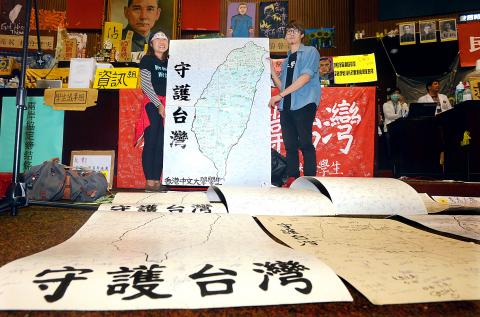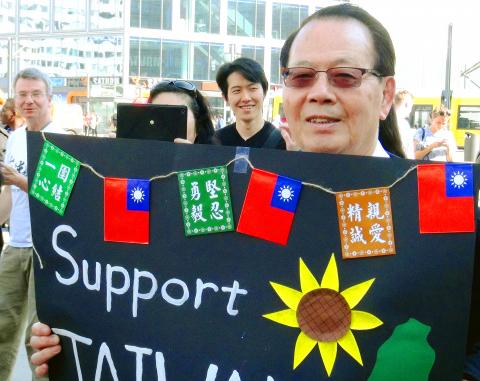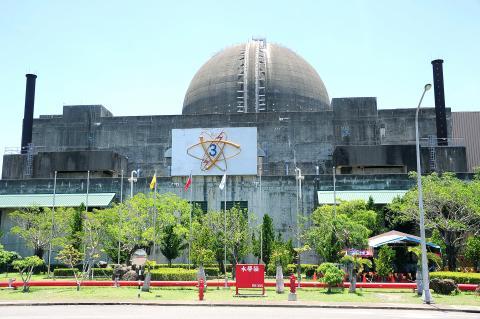Taiwanese students and expatriates in 49 cities across 21 countries organized rallies timed to coincide with Sunday’s demonstration in Taipei, as part of a global networking campaign to support the “Sunflower student movement.”
Calling it “24-Hour Relay Across the Globe in Support of Taiwan,” the worldwide rallies saw Taiwanese and other participants shouting the same slogans as their counterparts in Taipei: “Protecting Taiwan’s Democracy,” and “Withdraw the Trade Deal,” which gained press coverage and wide circulation among online social media.
Some students held up placards that read: “Taiwan is not for sale,” “Transparency, Democracy and National Security for Taiwan” in support of the movement which started with protesters occupying the legislature in Taipei on March 18.

Photo: Lin Cheng-kung, Taipei Times
The worldwide networking rally began in Australia and New Zealand on Sunday morning, with events in Auckland, Sydney, Melbourne, Brisbane, Canberra, Adelaide and other locations.
The international relay proceeded through the Japanese cities of Tokyo, Kyoto and Fukuoka, South Korea’s Seoul and Busan, Hong Kong, the Philippines and other Asian countries.
Hong Kong organizers said the protesters received an enthusiastic response, with more than 1,000 people joining the rally.

Photo: CNA
After some speeches, they marched from Causeway Bay to the Charter Garden next to the Legislative Council building.
As the day progressed, Taiwanese in Europe joined the global effort, with notable rallies in Berlin, Frankfurt, Vienna, Zurich, Paris, London, Edinburgh, Madrid and Stockholm.
The relay culminated in North America, with US events taking place in New York, Boston, San Francisco, Los Angeles, Seattle and other cities, as well as Montreal, Toronto and Vancouver in Canada.
More than 100 Taiwanese students and Taiwanese-Americans gathered in front of Washington’s Taipei Economic and Cultural Representative Office.
Despite the freezing rain and subzero temperatures, they performed street theater skits, handed out sunflowers to passersby and delivered a petition to the office.
Washington organizer Chao Tse-hua (趙澤華) said he is a student at Pennsylvania State University.
“We drove four hours from Pennsylvania to DC. We just want those students in Taiwan fighting for democracy to know that people abroad support their cause,” Chao said.
In New York City’s Times Square, about 400 people joined a mass sing-along and conveyed their messages in slogans, while holding sunflowers.
In the UK, more than 300 students and overseas Taiwanese headed to Trafalgar Square in London. They presented musical entertainment to the audience and vocalized their support of the Sunflower movement.
The event in Berlin took place at Alexanderplatz, a public square and transport hub, and was organized by Taiwanese university students.
Calling themselves the “3.30 Berlin Action Group,” organizers said more than 300 people joined in their rally, with a series of public discussions and lectures on the cross-strait agreement, the pros and cons of free trade, Taiwan’s human rights situation and its democratic governance system.
The largest event in Japan was held at Tokyo’s Yoyogi Park, where more than 700 people joined a rally.
Taiwanese students and expatriates in Tokyo were joined by their Japanese friends to call for the withdrawal of the cross-strait pact, shouting slogans in support of the Sunflower movement.
Additional reporting by Tsao Yu-fen, Hu Hui-ning and Chang Mao-shen

A fugitive in a suspected cosmetic surgery fraud case today returned to Taiwan from Canada, after being wanted for six years. Internet celebrity Su Chen-tuan (蘇陳端), known as Lady Nai Nai (貴婦奈奈), and her former boyfriend, plastic surgeon Paul Huang (黃博健), allegedly defrauded clients and friends of about NT$1 billion (US$30.66 million). Su was put on a wanted list in 2019 when she lived in Toronto, Canada, after failing to respond to subpoenas and arrest warrants from the Taipei District Prosecutors’ Office. Su arrived at Taiwan Taoyuan International Airport at 5am today on an EVA Air flight accompanied by a

An essay competition jointly organized by a local writing society and a publisher affiliated with the Chinese Communist Party (CCP) might have contravened the Act Governing Relations Between the People of the Taiwan Area and the Mainland Area (臺灣地區與大陸地區人民關係條例), the Mainland Affairs Council (MAC) said on Thursday. “In this case, the partner organization is clearly an agency under the CCP’s Fujian Provincial Committee,” MAC Deputy Minister and spokesperson Liang Wen-chieh (梁文傑) said at a news briefing in Taipei. “It also involves bringing Taiwanese students to China with all-expenses-paid arrangements to attend award ceremonies and camps,” Liang said. Those two “characteristics” are typically sufficient

A magnitude 5.9 earthquake that struck about 33km off the coast of Hualien City was the "main shock" in a series of quakes in the area, with aftershocks expected over the next three days, the Central Weather Administration (CWA) said yesterday. Prior to the magnitude 5.9 quake shaking most of Taiwan at 6:53pm yesterday, six other earthquakes stronger than a magnitude of 4, starting with a magnitude 5.5 quake at 6:09pm, occurred in the area. CWA Seismological Center Director Wu Chien-fu (吳健富) confirmed that the quakes were all part of the same series and that the magnitude 5.5 temblor was

Restarting the No. 2 reactor at the Ma-anshan Nuclear Power Plant would take up to 18 months, Minister of Economic Affairs J.W. Kuo (郭智輝) said today. Kuo was answering questions during a meeting of the Legislative Yuan’s Economics Committee, where legislators are considering amendments to the Renewable Energy Development Act (再生能源發展條) amid concerns about the consequences of the Pingtung County reactor’s decommissioning scheduled for May 17. Its decommissioning is to mark the end of Taiwan’s nuclear power production. However, Chinese Nationalist Party (KMT) lawmakers have proposed an amendment to the Nuclear Reactor Facilities Regulation Act (核子反應器設施管制法) that would extend the life of existing